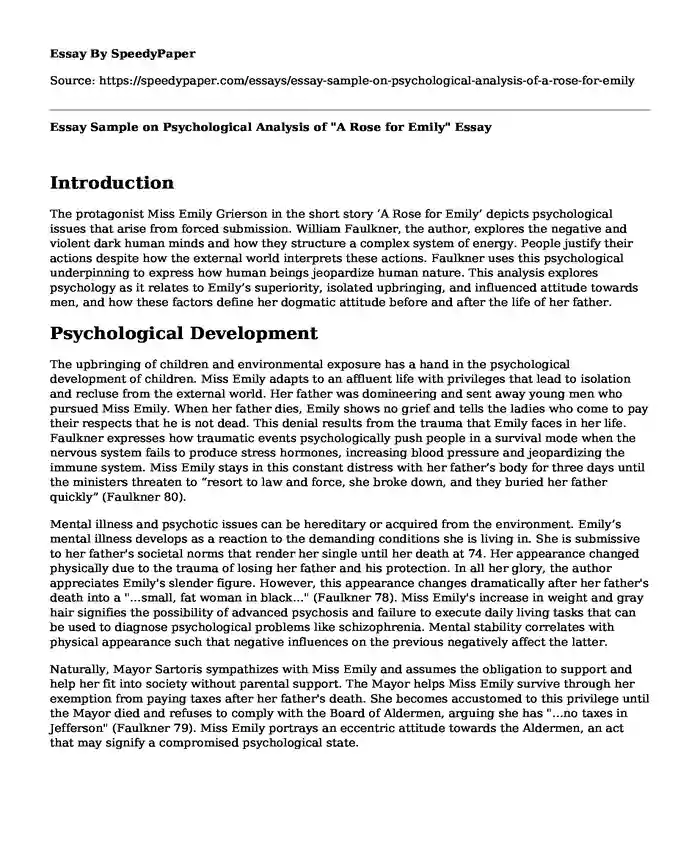
| Type of paper: | Essay |
| Categories: | Psychology American literature |
| Pages: | 4 |
| Wordcount: | 872 words |
Introduction
The protagonist Miss Emily Grierson in the short story ‘A Rose for Emily’ depicts psychological issues that arise from forced submission. William Faulkner, the author, explores the negative and violent dark human minds and how they structure a complex system of energy. People justify their actions despite how the external world interprets these actions. Faulkner uses this psychological underpinning to express how human beings jeopardize human nature. This analysis explores psychology as it relates to Emily’s superiority, isolated upbringing, and influenced attitude towards men, and how these factors define her dogmatic attitude before and after the life of her father.
Psychological Development
The upbringing of children and environmental exposure has a hand in the psychological development of children. Miss Emily adapts to an affluent life with privileges that lead to isolation and recluse from the external world. Her father was domineering and sent away young men who pursued Miss Emily. When her father dies, Emily shows no grief and tells the ladies who come to pay their respects that he is not dead. This denial results from the trauma that Emily faces in her life. Faulkner expresses how traumatic events psychologically push people in a survival mode when the nervous system fails to produce stress hormones, increasing blood pressure and jeopardizing the immune system. Miss Emily stays in this constant distress with her father’s body for three days until the ministers threaten to “resort to law and force, she broke down, and they buried her father quickly” (Faulkner 80).
Mental illness and psychotic issues can be hereditary or acquired from the environment. Emily’s mental illness develops as a reaction to the demanding conditions she is living in. She is submissive to her father's societal norms that render her single until her death at 74. Her appearance changed physically due to the trauma of losing her father and his protection. In all her glory, the author appreciates Emily's slender figure. However, this appearance changes dramatically after her father's death into a "…small, fat woman in black…" (Faulkner 78). Miss Emily's increase in weight and gray hair signifies the possibility of advanced psychosis and failure to execute daily living tasks that can be used to diagnose psychological problems like schizophrenia. Mental stability correlates with physical appearance such that negative influences on the previous negatively affect the latter.
Naturally, Mayor Sartoris sympathizes with Miss Emily and assumes the obligation to support and help her fit into society without parental support. The Mayor helps Miss Emily survive through her exemption from paying taxes after her father's death. She becomes accustomed to this privilege until the Mayor died and refuses to comply with the Board of Aldermen, arguing she has "…no taxes in Jefferson" (Faulkner 79). Miss Emily portrays an eccentric attitude towards the Aldermen, an act that may signify a compromised psychological state.
Public Image
People defend their dignity from public image execution as a reflex psychological action when the external environment becomes unsociable. Miss Emily encounters rough experiences when she tries to fit into society after her father’s death. She faces complacency from people in town who associates her mental instability with Lady Wyatt, her crazy aunt (Faulkner 81). Being the last Grierson, Emily neutralizes her past suicidal intentions from the public talk when she reaffirms her imperviousness (Faulkner 81). Emily links up with Homer Barron despite her father’s efforts to deny the relationship since Homer’s stature was beneath Emily’s. The people in town failed to understand Homer’s purpose in Emily’s life: to replace the man figure in her life and provide perceived protection (Faulkner 82). Despite her father’s isolation from the world, Emily does not tolerate intrusion in her father's absence.
Miss Emily has an abnormal behavior that includes the quest for murder and spending nights with a corpse. This behavior arises from her psychological detachment from a present conscious, explaining her dominant deviance in human aspirations. The townspeople refer to Emily as a crazy woman due to her idiosyncratic behavior (Faulkner 82). Emily fails to develop adaptive coping that makes her spend nights with Homer Barron's corpse for years. This action signifies the possibility of mental illness as she fails to develop psychotic responses for this type of stressor. Emily's grasp for reality is poor since she furnishes the podium, where she laid Homer's body with bridal details (Faulkner 83). Moreover, Faulkner expresses paranoia when Miss Emily buys rat poison from a pharmacy without disclosing her intentions with the drug.
Conclusion
In conclusion, mental health is a construct of interdependent factors from the upbringing environment and hereditary traits. Emily's father insulates her from societal hardships and denies her a social life that costs her a partner. Her father's death destabilizes her psychologically, leading to changes in her appearance and how society perceives her. She faces difficulty approaching the government representatives when asked to pay her tax obligations after the Mayor dies with his protection. Emily develops a perceived loyalty from psychological alliances she develops from her father's overbearing, physical constraints, and quest to fulfill societal expectations as a southern woman.
Work Cited
Faulkner, William. “A Rose for Emily.” Merill, 1970, pp.78-83.
Cite this page
Essay Sample on Psychological Analysis of "A Rose for Emily". (2023, Dec 12). Retrieved from https://speedypaper.com/essays/essay-sample-on-psychological-analysis-of-a-rose-for-emily
Request Removal
If you are the original author of this essay and no longer wish to have it published on the SpeedyPaper website, please click below to request its removal:
- Free Essay Describing Relationship Between Therapist and Client
- Student Life and Leadership Essay Samples
- My Autobiography Essay Sample
- Essay on Students' Sources, Free Example
- Free Essay on Mindfulness Cognitive Behavioral Therapy (CBT) for a Panic Event
- Essay Sample on Propaganda Used in Animal Farm
- The Free Paper on 7- Habits of Highly Effective People
Popular categories




